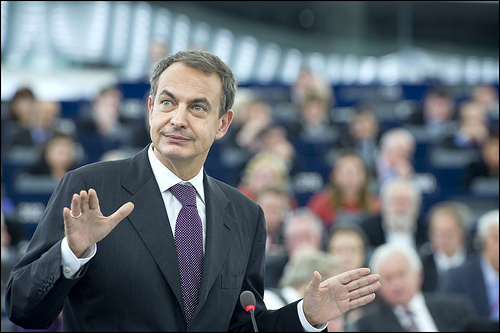Last week, the Spanish Presidency of the EU Council came up with a new draft resolution1http://www.laquadrature.net/files/Revised_proposal_for_a_Council_Resolution_on_IPR_enforcement_6164:105_20100205.pdf in response to the Commission’s communication on enhancing the enforcement of intellectual property rights (IPR) in the internal market.
[Update – March 5th, 2010: The resolution has been adopted by the Council with no significant changes.]

(CC) ByNcNd European Parliament
The text contains the same mistaken views as the draft report of Mrs. Gallo, member of the European Parliament, as it fails to draw essential distinctions between commercial and non-commercial infringements of copyrighted works or patented inventions. This draft resolution is set to become the Council’s official position after further negotiations between Member States and its final adoption. Unfortunately, as the excerpts outlined below make clear, the draft resolution displays a dangerous dogmatism in the field of innovation and access to knowledge policies. By leaving the door open to further criminalization of all kinds of infringements on IPR regardless of their motivations or actual socio-economic effects, the EU risks perpetuating doomed policies.
Other confidential working documents originating from the Spanish Presidency regarding the so-called “Granada Strategy”2EU telecoms ministers will meet for an informal meeting in Granada from 18th to 20th of April. give hints on the Spanish government’s approach to Net neutrality. But here again, Spain exposes a fundamentally flawed analysis of the role of telecoms operators in the Internet ecosystem. If such an assessment leads to actual EU policies, the European economy, cultural diversity and democracy at large would be severely harmed.
Policy-makers need to realize that Europe’s prosperity will not be enhanced by repressive IPR policies or the end of a truly free and open Internet. After the failure of the 2000 Lisbon strategy, which sought to make the EU “the most competitive and the most dynamic knowledge-based economy in the world“, European information policies need a radical change. A change that is for the most part absent from the documents issued by the Council Presidency these past few weeks.
The way forward lies in focusing on Internet users’ rights with respect to access to information commons, particularly by mandating Net neutrality and reforming the European copyright regime.
draft resolution">Excerpts of the draft resolution
18. EMPHASISING that in the field of copyright and related rights, piracy in cultural and creative goods is , damaging the legal marketing of the media, especially through the Internet; hampering the arrival of competitive business models of legal supply of cultural and creative content, calling into question the adequate remuneration of rightholders and holding back the dynamism of the European cultural industry that provides access to legal, diverse and high quality cultural supply;
20a. RECOGNISES that developing the legal offer of cultural and creative content, while at the same time preventing and combating piracy, is necessary for the economic growth, employment and cultural diversity;
28. NOTES the importance of public awareness in relation to the impact of counterfeiting and piracy on society and on the economy, in particular the potential danger of counterfeits and pirated products for health and safety as well as for European competitiveness, creation, innovation and jobs, and encourages the Commission, the Member States and stakeholders including consumers, to analyse and implement effective awareness campaigns, including a European Day against Counterfeiting and Piracy on 11 June. The financial implications will be assessed by the Observatory in cooperation with the Commission in order to define appropriate funding resources. The campaigns will focus on specific audience targets like consumers and young people;
30b. INVITES the Commission to analyse the opportunity of submitting an amended proposal for a Directive on criminal measures aimed at ensuring the enforcement of intellectual property rights, in order to complete the EU legislative framework in the field of IPR enforcement.
39a. INVITES the Member States and the Commission to act towards promoting a high level of protection of Intellectual Property in both bilateral and multilateral international agreements.
References

